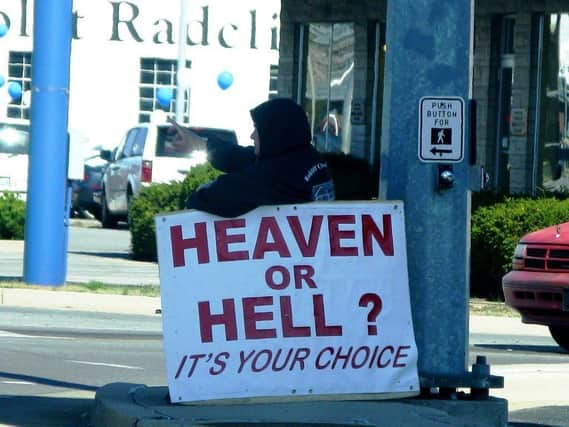Samuel Morrison: Draconian Belfast City Council doesn’t believe in freedom of speech


The image of Luther walking resolutely through the streets, hammer and Theses in hand, is certainly one which appeals to the mind of someone who wants a dramatic opening to the story of the Reformation.
Interestingly, however, the story first emerged not in 1517 but 30 years later and there is no record of Luther himself ever mentioning it.
Advertisement
Hide AdAdvertisement
Hide AdThe hold of the story on the popular imagination of Protestantism is partly explained by the symbolism of a single man driven by the courage of his own convictions that he had rediscovered the faith of the New Testament marching right up to the front door of the nearest branch office of the apostate system to tell them exactly what he thought.
Regardless of whether or not Luther nailed his Thesis to a church door, we do know that 120 years later the introduction of Charles I's new Prayer Book sparked a riot in St Giles' Cathedral with one member of the congregation, Jenny Geddes, throwing a stool. That act lead to two Bishops' Wars, the English Civil War and the establishment of a republic.
Whatever one's take on the actions of Luther and Jenny Geddes few, I suspect, are aware that there are serious efforts to curtail the right to freedom of expression in our own capital city, including proposals to place stringent restrictions outside all places of worship.
Belfast City Council is currently running a consultation on byelaws which, professedly, deal with the “prevention and suppression of nuisances in Belfast city centre”.
Advertisement
Hide AdAdvertisement
Hide AdHiding behind what may appear to be a laudable title is legislation which has serious ramifications for freedom of speech.
Under these proposed byelaws an absolute prohibition is placed on the display of literature within 100 metres of any place of worship, or for that matter the use of amplification equipment in the same area.
Similar rules apply to places of public entertainment “or other place of public assembly in which person or persons so assembled, after being requested to desist by an authorised council officer or police officer”.
Such sweeping powers should concern all who value freedom of expression.
Advertisement
Hide AdAdvertisement
Hide AdFurthermore, the laws place an absolute prohibition on stands, stalls or vehicles with promotional literature or information “whether connected to a business, charity, political or any other non-commercial purpose … in a public place in the primary retail core without a permit issued by the council.”
Whatever one's thoughts that is a totally impractical proposition.
As drafted the law would criminalise someone who had a ‘Free Palestine’ or poppy sticker in their car window as both are covered by the ludicrously wide definition.
Those behind the proposed byelaws have made no secret of the fact that they want to use them to deal with what they regard as the “problem” of street preachers and pro-life activists.
Advertisement
Hide AdAdvertisement
Hide AdThe Green Party, for example, has cited the distribution of ‘graphic’ imagery of aborted children as something they want to deal with.
Ironically, Belfast City Council recently unveiled a statue to Fredrick Douglas, an anti-slavery campaigner who made use of graphic imagery of abuse slaves suffered in his campaign both in Belfast and the US as well as being, of all things, a Methodist street preacher.
There can be no doubt that street preachers are one of the chief targets of these laws. They are referenced within the Equality Screening document as one of the groups affected by the legislation.
Under Belfast City Council's proposals they will be required to obtain a permit before being able to distribute literature from a stand or using amplification equipment.
Advertisement
Hide AdAdvertisement
Hide AdThe cost of the permit isn't specified and the council proposes giving itself sweeping powers to impose and vary such conditions as it sees fit on permits.
Tellingly, the council exempts all activities run by itself or any government department from having to comply with these requirements.
In spite of the obvious target of this legislation being people who have strong religious convictions, the council's equality screening claims that the proposals have no impact on people of different religious convictions.
Ironically, in the same document it acknowledges that “is possible that the byelaws may affect more people from the Protestant or Christian background who make up a higher percentage of those individuals who participate in street preaching”.
Advertisement
Hide AdAdvertisement
Hide AdThe council even claims that these byelaws will have no impact on anyone with regards to political opinion. This is manifestly nonsense.
The byelaws place an absolute prohibition on stands, stalls or vehicles with promotional literature or information “whether connected to a business, charity, political or any other non-commercial purpose … in a public place in the primary retail core without a permit issued by the council.”
Belfast City Council is, of course, a political body. It should worry us all that it is seeking to police political speech within our capital.
If you believe in freedom of speech, you believe in freedom of speech for views you do not like and don't share. Belfast City Council manifestly doesn't. Otherwise it wouldn't be seeking to police freedom of expression in such a draconian way.
l Samuel Morrison is press officer for the TUV